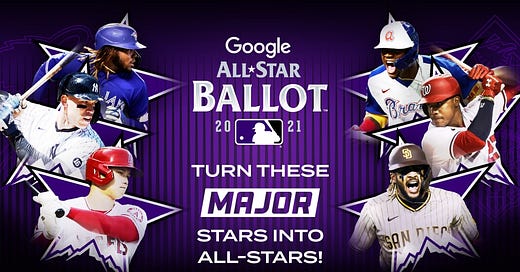Voting and the All-Star Game
When I was a kid, I used to wonder why fans who voted for All-Stars wouldn’t just vote for all the players on their favorite team. Didn’t fandom entail stubbornly insisting that every player you rooted for was objectively the best, even if you had no evidence to back that up? And it wasn’t like there was any penalty for voting for someone who didn’t “deserve” to be an All-Star.
And yet, on the occasions that I filled out my own ballot, shameless Yankee fan though I was, even I could not bring myself to vote for, say, Chuck Knoblauch. There were, of course, limits to my objectivity: no Red Sox ever, no matter how good a season Nomar was having; and I may have voted for Bernie Williams over Ken Griffey Jr. one year. But I did feel obliged to (mostly) vote for players I honestly believed to be the best at their position, even if that belief was misguided.
It seems I was not alone. To this day, I am consistently surprised at how good of a job fans do electing All-Stars. Of course, there are always snubs and oversights, but they get more right than wrong. If I look at the elected lineups for tonight’s game, I struggle to find much to quibble with. Maybe Carlos Correa should start for the AL at shortstop instead of Xander Bogaerts? But Bogaerts is having a career year and Correa is hurt anyway. Maybe Mike Zunino should catch instead of Salvador Perez? Or Jake Cronenworth over Adam Frazier for the NL second base slot? These are contestable grievances.
Of course, the fan vote isn’t perfect. Players like Derek Jeter and Ichiro probably made more All-Star Games than they deserved because fans liked them. And the game has a persistent pro-Blue Jays bias, since Canadians do seem to vote as a block. But weird All-Star selections come from idiosyncratic manager, or the rules about every team needing a representative, more often than they come from irrational fans.
In general, fans take their role as voters seriously—which is kind of funny, because it isn’t very serious at all. But if you give people input on a decision, they tend to feel invested in that decision, even if the stakes are low. Now that the All-Star Game doesn’t even decide home field advantage in the World Series, the stakes are indeed basically zero. But a fan filling out an All-Star ballot is still more likely to look up who is having a good season, whose numbers are up or down, and therefore become more attuned to what’s going on around the league. Getting this buy-in from fans is an accomplishment for the league, whether or not the fans make “the right choice.” (By this token, the recent changes MLB made to do the vote in phases are good because they encourage voters to check in on the state of the league at least twice.)
It’s worth applying this lesson to voting in general. I remember an organizer friend of mine once suggested, half-jokingly, that, if you are running an organization, you should have members vote on something at every meeting, no matter how trivial. That way, people who made the effort to show up will leave thinking, “At least I helped decide something—it wasn’t a total waste of time” and be more likely to come back in the future.
That offhand comment changed the way I thought about voting. Previously I had only ever considered it as a way of selecting leaders or policies—or granting those leaders a veneer of popular legitimacy when their policies cause heinous outcomes. But I suspect that a proper understanding of elections considers their impact on voters themselves. In other words, the goal of voting for All-Stars is not just to select a good team, but to encourage fans to take an active interest in the league.
By this standard, American elections are a complete disaster not because the wrong people win (although they do) but because of how dissatisfied they leave its participants. Right now, at least in Western countries, elections seem to exacerbate social divisions, leaving the losers (and often winners) embittered and alienated. It would be as if 40% of baseball fans refused to recognized Nolan Arenado as the rightful All-Star and insisted that the military or a special prosecutor or the Electoral College install Manny Machado at third base.
But in truly democratic societies and institutions, voting can actually be a productive tool for resolving tensions, not causing them, and making people feel like they are active participants in group decisions. If your elections do not feel this way, then it suggests that there is something fundamentally undemocratic about the society in question that voting alone cannot fix. Because, as the All-Star Game shows, voting does not have to be this way.



